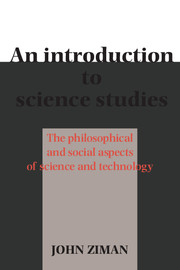Book contents
- Frontmatter
- Contents
- Preface
- 1 ‘Academic’ science
- 2 Research
- 3 Validity
- 4 Communication
- 5 Authority
- 6 Rules and norms
- 7 Change
- 8 The sociology of scientific knowledge
- 9 Science and technology
- 10 Pure and applied science
- 11 Collectivized science
- 12 R & D organizations
- 13 The economics of research
- 14 Science and the State
- 15 The scientist in society
- 16 Science as a cultural resource
- Index
- Frontmatter
- Contents
- Preface
- 1 ‘Academic’ science
- 2 Research
- 3 Validity
- 4 Communication
- 5 Authority
- 6 Rules and norms
- 7 Change
- 8 The sociology of scientific knowledge
- 9 Science and technology
- 10 Pure and applied science
- 11 Collectivized science
- 12 R & D organizations
- 13 The economics of research
- 14 Science and the State
- 15 The scientist in society
- 16 Science as a cultural resource
- Index
Summary
‘…in the discovery of secret things and in the investigation of hidden causes, stronger reasons are obtained from sure experiments and demonstrated arguments than from probable conjectures and the opinions of philosophical speculators of the common sort.’
William GilbertScientific knowledge
The purpose of science is to obtain scientific knowledge. That is to say, scientific work is directed towards acquiring a special type of information, either for immediate practical use or for publication in textbooks, encyclopaedias, learned journals, etc., under various headings such as physics, chemistry or biology. A typical item of scientific information might be, say: ‘The benzene molecule contains six carbon atoms arranged in a ring’. This is clearly somewhat different from the sort of knowledge usually to be found in novels, law reports, sermons, or political manifestos – for example, that ‘it is love that makes the world go round’, or ‘the greater the truth, the greater the libel’.
But what are the distinguishing features of scientific knowledge as such? This traditional philosophical question is important because it may decisively affect our actions to know that a particular piece of information is ‘scientifically’ warranted (cf. §16.3). It is also one of the key questions about science as a human activity, for it asks about the fundamental objectives of research.
- Type
- Chapter
- Information
- An Introduction to Science StudiesThe Philosophical and Social Aspects of Science and Technology, pp. 13 - 33Publisher: Cambridge University PressPrint publication year: 1984



